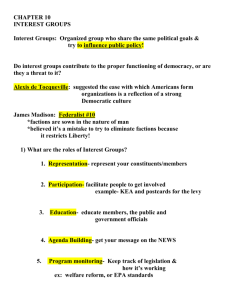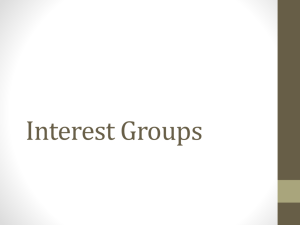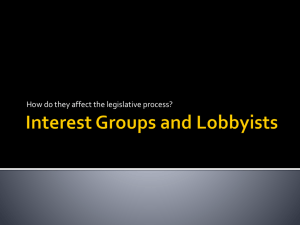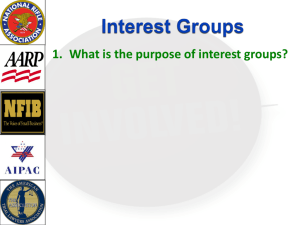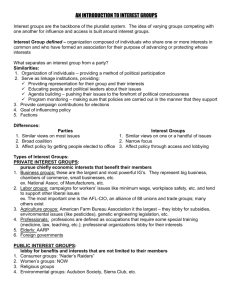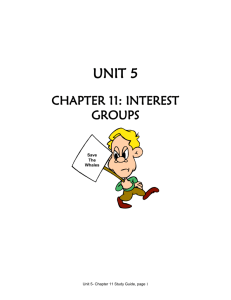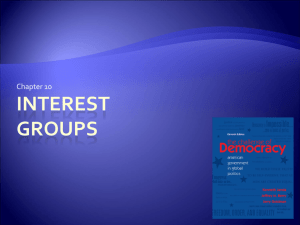Chapter 10: Interest Groups
advertisement
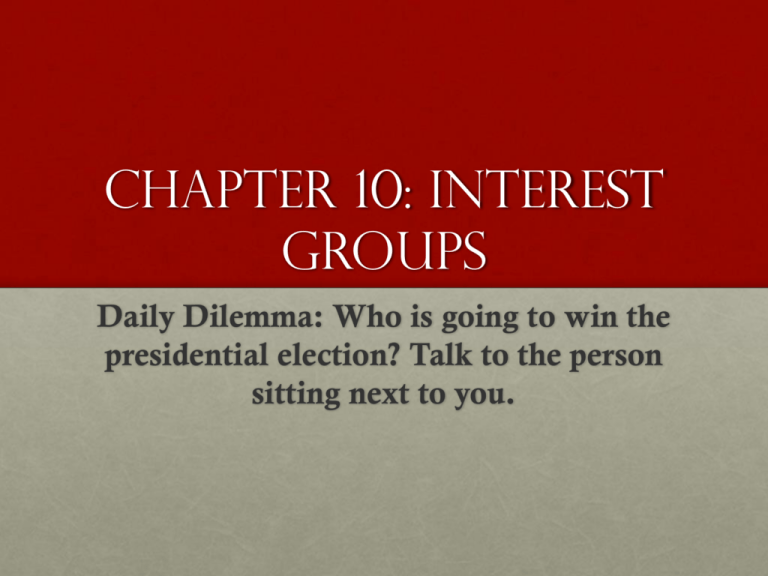
Chapter 10: Interest Groups Daily Dilemma: Who is going to win the presidential election? Talk to the person sitting next to you. Policymaking • A continuous, long-term process, and those who want to try to influence government must develop appropriate strategies Interest Groups and the American political tradition • An interest group is an organized body of individuals who share some political goals and try to influence public policy decisions • Are interest groups good or evil? Pro or anti? Anti-Interest Group • People dislike interest groups in general because they do not offer equal representation to all • Some sectors of society are better represented than others • “We hate lobbies, except those who speak on our behalf ” Pro-Interest Group • It’s natural for people to form associations • “Liberty is to faction what air is to fire” –Madison • When issues need interest groups, they will form The Role of interest groups • Representation– interest groups represent people before their government • Participation– Interest groups are vehicles of political participation • Education– Interest groups help educate their members, the public at large and government officials • Agenda Building– Interest groups bring news issues into the political limelight • Program Monitoring– Interest groups and lobbies follow government programs that are important to their constituents, keeping up to date of developments in Washington and the communities where policies are instituted How Interest groups form • Truman– “When individuals are threatened by change, they band together in an interest group.” Points of disturbance force new groups to form. • Interest group entrepreneurs– An interest group organizer or leader • Must have something attractive to “market” in order to convince people to join • The organizer of an ideological group must convince potential members that the group can effectively lobby the government to achieve their particular goals Who is being organized? • Three variables discuss whether a group will become fully organized or not: 1. An adverse change or disturbance can contribute to people’s awareness that they need political representation. 2. The quality of leadership is critical to the organization of interest groups. 3. The higher the socioeconomic level of potential members is, the more likely they are to know the value of interest groups and to participate in politics by joining them. Interest group resources • A group’s most significant resources are its members, lobbyists, and money, including funds that can be contributed to political candidates MEMBERS– One of the most valuable resources an interest group can have is a large, politically active membership. A legislator may sway his/ her opinion on letter writing or phone call campaigns. • Members must be persuaded the group is doing a good job to keep its members. New members must also be attracted. • Groups must prevent the free-rider problem– the idea that people benefit from certain activities but do not contribute to those activities Lobbyists • Lobbyists represent the organization before the government • Lobbying mainly means passing information on to policymakers (though is sometimes maligned because it looks like people are trading favors) • When hiring a lobbyist, an interest group looks for someone who knows people in Washington. • 40% of representatives and senators who leave Congress become lobbyists. Political action committees • An organization that pools campaign contributions from group members and donates those funds to candidates for political office • The greatest PAC growth has been corporate • Most PACs are rather small, but 5% of PACs make up the largest share of campaign contributions • Critics charge that PAC contributions influence public policy, yet political scientists have not been able to document consistent link between campaign donations and the representatives vote on specific issues • Members of Congress or staffers would have a hard time turning down a meeting with a PAC who made a large campaign contribution Lobbying tactics DIRECT LOBBYING • Relies on personal contact with policymakers • Lobbyists must maintain contact with congressional and agency staffers, constantly providing them with pertinent data GRASSROOTS LOBBYING • Grassroots tactics include letter-writing campaigns and protests. Often used in conjunction with direct lobbying. POLITICAL PROTEST • If the government is unresponsive, a group might resort to political protest Information campaigns • Organized efforts to gain public backing by bringing a group’s views into public attention • Sponsoring research is another way interest groups press their cases • COALITIONS form when two groups share an opinion on an issue Is the system biased? • Policymaking is determined more by the interaction of groups with the government than by elections • How do we determine if the system is fair? 1. All significant interest groups should be adequately represented by lobbying groups 2. Government should listen to the views of all major interests as it develops policy Membership patterns • Some sectors of society are much better represented than others • Those who work in business, or in a profession, and those with a high level of education, and those with high incomes are more likely to belong to an interest gorup • 10% of adults who work in executive, managerial or administrative capacity are represented by 82% of the organizations that advocate on economic issues Citizen groups • Citizen’s groups are lobbying groups that are unrelated to people’s vocational interests and rather focus on policies • Poor people’s lobbies are not enough based on the numbers of individuals who benefit from welfare and social service programs • The interests that are most affected by free riders are broad societal problems, in which everyone could be considered to have a stake (the environment, consumer protection) Business mobilization • Business lobbies have increased in Washington • Whereas citizen groups can try to mobilize individual members, trade associations can mobilize the corporations that are members of the organization reform • Some sectors of the interest group community may still enjoy advantages that are unacceptable • Are the advantages of some groups so great that they affect the equality of people’s opportunity to be heard? Do the disadvantaged need to be protected? • Do all interest groups have the same ability to form?



